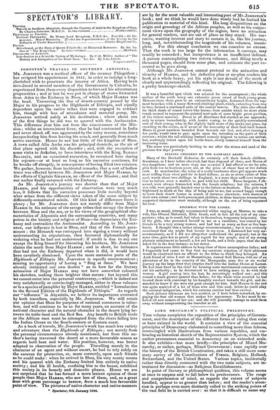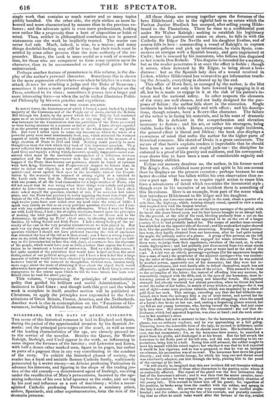LORD BROUGHAM'S POLITICAL PHILOSOPHY.
THIS volume completes the exposition of the principles of Govern- ment, and the description of the different forms of ruling that exist or have existed in the world. It contains a view of the essential principles of Democracy elaborated to something more than fulness, intermingled with illustrations from various republics, and em- bracing an historical sketch of the Representative System, which the author pronounces essential to democracy on an extended scale. It also exhibits—but more briefly—the principles of Mixed Mo- narchy, or rather, perhaps, Mixed Government ; runs rapidly over the history of the British Constitution, and takes a still more sum- mary survey of the Constitutions of France, Belgium, Holland, Switzerland, and the United States. Various topics, incidentally rather than directly connected with the two main subjects, are in- troduced for discussion—as Religious Establishments.
In point of literary or philosophical qualities, this volume seems at once to surpass and to fall below its predecessors. The range and comprehension of mind, as regards the extent of subjects handled, appear to us greater than before; and the reader's atten- tion is perhaps even more distinctly called to the striking points of the vast field he is carried over : so that it is difficult to name any
single work that contains so much matter and so many topics pithily handled. On the other aide, the style strikes as more la- boured and more characterized by manner than in the previous vo- lumes ; and the advocate spirit is even more predominant, looking
now rather like a propensity than a bent of disposition or habit of
mind. Thus, neither in philosophical conclusions nor in general statements can the work be implicitly trusted. The reader can never feel safe. Much, indeed, is true, to a truism ; and many
things doubtful-looking may still be true ; but their truth must be settled by some other process than the mere authority of the ex- pounder. Hence, the book is more useful as a work of consulta- tion, for those who are competent to form sonic opinion upon its character, than to be recommended as an implicit guide for the uninstructed.
Perhaps another feature of prominence in this volume, is the dis- play of the author's personal character. Sometimes this is shown in the mere expression of crotchets—as when he hitches in a note to attack Rams for attacking a judge and the Duke of BEDFORD ; sometimes it takes a more personal shape—in the chapter on the Press, confined to its vices ; sometimes it passes into a larger and more interesting form—as when the noble author illustrates Politi- cal Philosophy by his own practice and experience.
CONFESSION, OR THE CRISIS ESCAPED.
In recent times, the Government of which I formed a part, backed by a large majority of the Commons and of the People out of doors, carried the Reform Bill through the Lords, by the power which his late Majesty had conferred upon us of an unlimited creation of Peers at any stage of the measure. It was fortunate for the Constitution that the patriotism of the Peers prevented us from having recourse to a measure so full of peril. I have always regarded it as the greatest escape which I ever made in the whole course of my public life. But were I called upon to name any measure on which the whole of a powerful party were most unanimously bent, nay, which attracted the warmest support of nearly the whole people, I should point at once to the measure of a large creation of Peers in 1831 and 1832. Nothing could possibly be more thoughtless than the view which they took of this important question. They never reflected for a moment upon the chance of their soon after differing with Lord Grey and myself; a thing which, however, speedily happened—never con- sidered what must be the inevitable consequence of a difference between ourselves and the Commons—never took the trouble to ask what must happen if the Peers, thus become our partisans, should he found at variance with both King, Commons, and People—never stopped to foresee that, in order to defeat our oligarchy, a new and still larger creation must be re- quired—and never opened their eyes to the inevitable ruin of the Consti- tution by the necessity thus imposed of adding eighty or a hundred to the Lords each time that the Ministry was changed. I have seldom met with one person, of all the loud clamourers for a large creation of Peers, who did not admit that he was wrong when these things were calmly and plainly stated to him—these consequences set before his eyes. But 1 have often since asked myself the question, whether or not, if no secession had taken place, and the Peers had persisted in really opposing the most important pro- visiens of the bill, we should have had recourse to the perilous creation ? Well nigh twelve years have now rolled over my head since the crisis of 1832: 1 speak very calmly on this as on every political question whatever; and I can- not with any confidence answer it in the affirmative. When I went to Wind- sor with Lord Grey, 1 had a list of eighty creations, framed upon the principles of making the least possible permanent addition to our House and to the Aristocracy, by calling up Peers' eldest sons, by choosing men without any families, by taking Scotch and Irish Peers. I had a strong feeling of the ne- cessity of the case in the very peculiar circumstances we were placed in. But such vms my deep sense of the dreadful consequences of the act, that I much question whether I should not have preferred running the risk of confusion that attended the loss of the bill as it then stood ; and I have a strong impres- sion on my mind, that my illustrious friend would have more than met me half- way in the determination to face that risk, (and, of course, to face the clamours of the people, which would have cost us little,) rather than expose the Consti- tution to so imminent a hazard of subversion. Had we taken this course, I feel quite assured of the patriotism that would have helped us from the most distiuguished of our political antagonists: and I have a firm belief that a large measure of reform would have been ubtuined by compromise—a measure which, however hateful at the moment to thoughtless, reckless men, become really more eager about the mode of obtaining it than about the object itself, would afterwards have proved satisfactory to all. 111y opinion of Lord Greys extreme repugnance to the course upon which we felt we were forced, has been con- firmed since he read the above passage.
This volume, " expounding the principles of constitutional polity that guided his brilliant and useful Administration," is
d edicated to Earl GREY ; and though both this part and the whole work is complete in itself; another section will be published at Christmas, to apply the principles now expounded to the Con- stitutions of Great Britain, France, America, and the Netherlands. Another work is also in contemplation on the "Functions of Go- vernment, including Political Economy and Political Arithmetic."



























 Previous page
Previous page